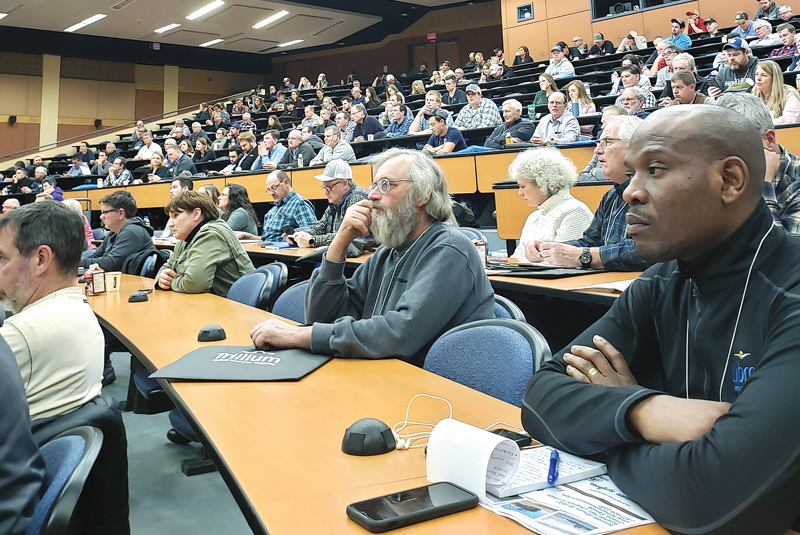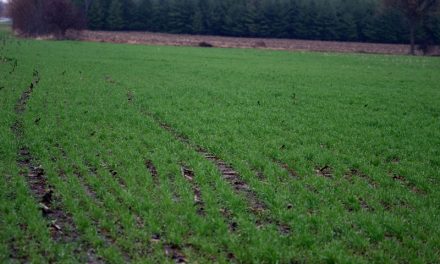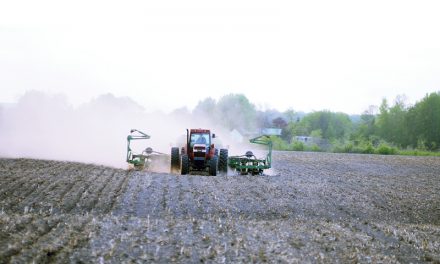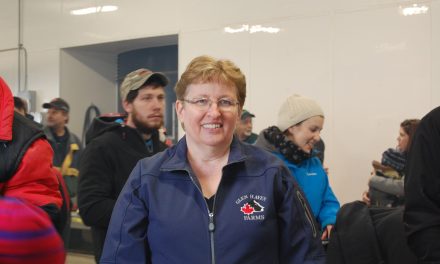Andrew Schrumm’s keynote speech on Farmer 4.0, the upcoming agricultural revolution, gathered a crowd at the 2020 FarmSmart conference in Guelph. Macdonald photo

by Cindy Macdonald
AgriNews Staff Writer
GUELPH – In his keynote speech at FarmSmart 2020, Andrew Schrumm of RBC said “we’re in the early stages of the fourth industrial revolution.” Schrumm is an expert in how industries respond to disruption, and was a contributor RBC’s Farmer 4.0 research report on skills in agriculture.
He said automation and data analytics will be the hallmarks of Farmer 4.0. “Ag is becoming a knowledge-based industry, requiring more and more services.” This will be reflected in the skills needed for the sector in the future.
The 2020 FarmSmart conference was held Jan. 18 in Guelph with about 800 people in attendance. Organizer Julie Whalen said the attendance was down slightly from previous years, likely due, in part, to the fact that some producers were still working to get crops in from the field. In addition, a threatened snow storm may have deterred some attendees.
The conference is presented by the Golden Horseshoe and Heartland Soil and Crop Improvement Associations, in partnership with Ontario Ministry of Agriculture, Food and Rural Affairs, The Beef Farmers of Ontario, and the Ontario Agricultural College.
The conference had a session geared to younger farmers, the Young Farmers Forum, focused on skills needed for the future and digital technology. Kaye McLagan, an independent agronomist with Willowgrove Ag Services, said it’s tough for the next generation taking over a farm operation, because “all the information is in Dad’s head.”
She noted that people adopting newer digital tools “have to be willing to pursue knowledge of tech nology.” McLagan suggested anyone thinking about implementing new digital tools should invite their local dealer out to the farm to determine what is needed.
Andrew Schrumm, the conference’s keynote speaker also discussed skills with the attendees of the Young Farmers Forum. He noted a “need for better sharing, better knowledge transfer” among small agricultural businesses in Canada. The challenge is to find ways to collaborate, he said.
In his keynote speech, Schrumm said the ag industry cannot lose sight of the “productivity imperative.” The sector has been increasing its productivity by 5.5 per cent per year for the past few years, by adding machinery and automation. Schrumm suggested agriculture needs to focus on skills development and technology innovation to maintain that productivity growth.
Looking ahead to 2020 markets, Steve Duff of OMAFRA said predictions regarding the hog market are tricky because it is not clear yet if the Chinese market will buy significantly more pork as a result of swine fever.
He expects fairly flat prices for grains next year. He said less grain is being sold and marketed “right off the combine.” Instead, producers are taking advantage of forward and basis pricing.
The demand for the agriculture sector is huge, said Duff, but the industry must prepare for more unpredictability and volatility within the production year. On the plus side, he said, Canadian farmers have gotten better at marketing their products, are using tools such as crop insurance, and participate in business risk management programs.
But, farmers must push for production and cost efficiencies, reduce debt and increase their liquid assets, he said. They should ensure credit is in place before it is needed.
Looking back at 2019, agronomists Sharon Vogels and Matt Rundle characterized it as “a struggle, start to finish.”
Rundle said one lesson learned from 2019 was “don’t get caught up with the calendar date” when planting. In his area, Harriston, Ont., corn that was planted mid-May 2019 sat in cold, wet soil, while corn planted later, on June 1, looked just as good as the season went on.
Have a backup crop plan in mind; this helps you think on your feet, he added.













